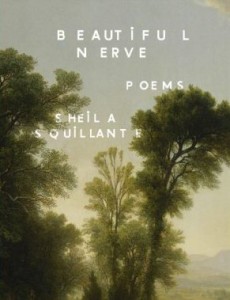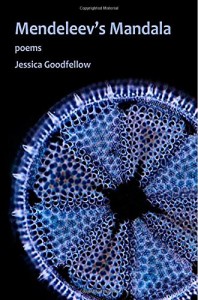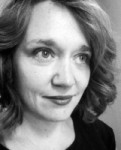One thing poetry can do is present the common and familiar in completely new terms, clarifying or uncovering ideas or thoughts or insights that we didn’t see before or were not aware of. Both of our Poetic Voices poets featured today have done that in recently published collections.
Sheila Squillante’s Beautiful Nerve looks at the familiar and commonplace – a sparrow, a slant of light, the color green, a cookbook, bears – and essentially re-imagines them. They are still familiar, and yet, in Squillante’s hands, they had become something different. An example is what she does with the concept of landscape – she puts a picture frame around it.

Look at the landscape for a while—
it’s a matter of surrounding with a frame
a portion of your vision,
the dance on salt, the earth
flattered and wonderfully surprised.
Eyes shining, explore
the metaphoric potential in
to glide over, the mark with a slur.
Make up a secret about yourself.
Turning the natural into art interprets the artist (or poet) within that landscape, and within the space of a relatively few lines. Every poem in the collection has this effect, although some are longer than others (“Divine Girl” is one of the shortest).
Squillante is the author of three poetry chapbooks, serves as editor-in-chief of The Fourth River, and is an assistant professor of English at Chatham University in Pittsburgh, where she’s associate director of the MFA program in Creative Writing. In Beautiful Nerve, she’s created a collection of poems that is full of wonder and beautiful things.
In April, we noted The Insomniac’s Weather Report by Jessica Goodfellow, published last year. She has a new collection this year that’s even more engaging, Mendeleev’s Mandala. It’s about pilgrims, and time, and science, and self-improvement projects, among other things, with sharply defined images that grab your attention and hold it.
Here is one of the poems about time.

Wind launches the laundry, shakes hands
with a scarecrow, shuffles rust-edged petals
of dogwood, hungry for anything hung,
dangled, crucified. Who do you—or maybe
Hoodoo you. She calls, passing. The wind is
a woman, we say, when a thing disappears;
a man, when a thing is demolished.
I’ve come to the field today to be
away from metronome, clock, and door—
instruments of opening and closing, doing,
undoing, redoing. The wind is no one’s
instrument; it opens and opens, which is why
it cannot stay. Once you made me a gift
of a metronome, saying, Without symmetry,
there’d be too much to desire. What your rule forgets
is the human heart’s four unequal chambers,
left of center. But its valves close and open,
its throbbing is even, metronome in give-and-take
with wind. Or vice versa. No one’s wholly satisfied,
or wholly dispossessed, in this elliptical ruin of breath.
The 12 poems that comprise the “time” section of the collection (section two) are particular favorites. Included in the 12 are poems about a candle clock, a sundial, an hourglass, the invention of the clock face, and even a list of words a blind man’s wife must no longer use (and, yes, it’s about time).
Goodfellow has published two previous collections and received a number of awards. She currently works at a university in Japan. She blogs at Axis of Abraxas: A Poetry Blog. Mendeleev’s Mandala is an intriguing collection. If it’s an indication of future work, we have some great poetry to look forward to.
Photo by Vlastimil Koutecky, Creative Commons, via Flickr. Post by Glynn Young, author of the novels Dancing Priest and A Light Shining, and Poetry at Work.
___________________________

—Jeanetta Calhoun Mish
How to Read a Poem: Based on the Billy Collins Poem “Introduction to Poetry” uses images like the mouse, the hive, the switch—to guide readers into new ways of understanding poems. Excellent teaching tool. Anthology included.
- Poets and Poems: Forrest Gander and “Mojave Ghost” - March 27, 2025
- Poets and Poems: Siân Killingsworth and “Hiraeth” - March 25, 2025
- Poets and Poems: Donna Hilbert and “Gravity” - March 20, 2025



Mary Sayler says
Glynn, you’ve not only introduced us to two fine poets but have given readers insights into writing poetry! Thanks. I’ll highlight this on the Christian Poets & Writers blog – http://www.christianpoetsandwriters.com.
Glynn says
Mary, thank you! I really enjoyed both collections.
Sandra Heska King says
My bank account is struggling to keep up with your recommendations, Glynn. 🙂
Sandra Heska King says
Maybe I need to write a book to pay for my books. 😉
Glynn says
Sandra, that is a great idea. You could call it “How to Make Money Reading Books.” Thanks for reading, and the comments.
Sandra Heska King says
Or “How to Lose Money But Find Yourself Reading Books.” 😉